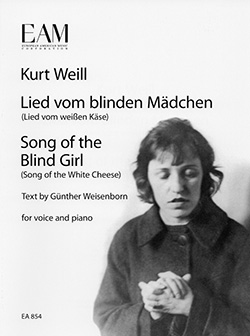
In the fall of 2017, the Weill world was rocked by the discovery of a long-forgotten song composed for a 1931 Berlin revue. Several well-known composers and writers contributed; Weill collaborated with Günther Weisenborn on a song titled Lied vom blinden Mädchen (Song of the Blind Girl), also known as Lied vom weißen Käse (Song of the White Cheese). Lotte Lenya gave the first performance. After the revue closed in December 1931, the song disappeared until Kurt Weill Edition managing editor Elmar Juchem found the manuscript in the theater collection of the Freie Universität Berlin. Read Juchem’s account of the discovery in the Kurt Weill Newsletter.
Now the whole world can share the song, just published in piano-vocal score by European American Music (EA 854) with Weisenborn’s original lyrics along with an English translation by Michael Feingold, available from Hal Leonard. Not only that, complete recordings of the song, in German and English, by soprano Ute Gfrerer and pianist Shane Schag, may be downloaded from CDBaby or streamed from Spotify and iTunes.
The oddly titled song made fun of popular faith healer Joseph Weißenberg, who relied on poultices of soft, white cheese to cure the ailing. In this instance, his attempt to prevent a young girl from going blind failed, and the authors seized on the well-publicized case as the occasion of a satirical song which incorporated a phrase from a German hymn, “So nimm denn meine Hände und führe mich” (Then take my hands and lead me).
Playwright and and novelist Günther Weisenborn (1902-1969) wrote successful dramas in Weimar Germany, survived Nazi imprisonment, and resumed his career after the war. He co-wrote the screenplay of a film adaptation of The Threepenny Opera in the early sixties; the wartime diaries and correspondence of Weisenborn and his wife, Joy, have been published in Germany under the title Liebe in Zeiten des Hochverrats (Love in Times of High Treason).


